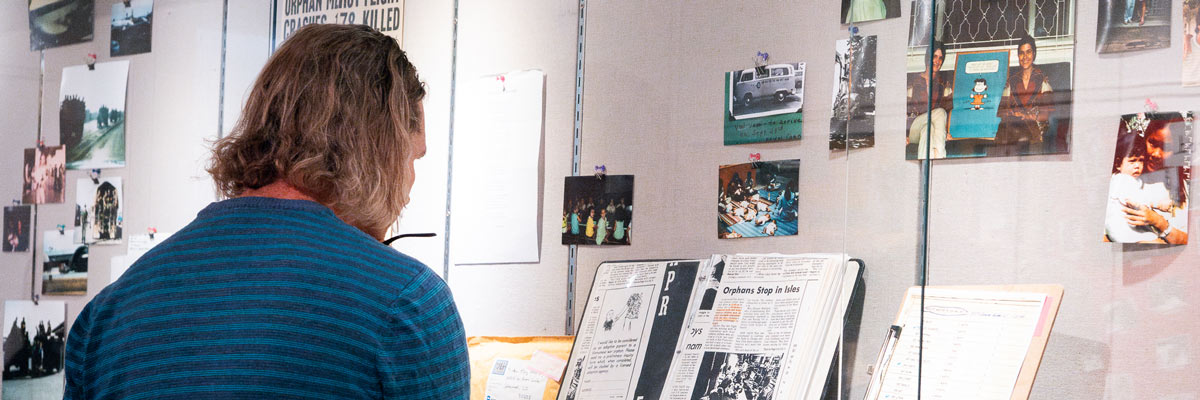Operation Babylift: Uncovering memory in media
By Hadley Jenkins
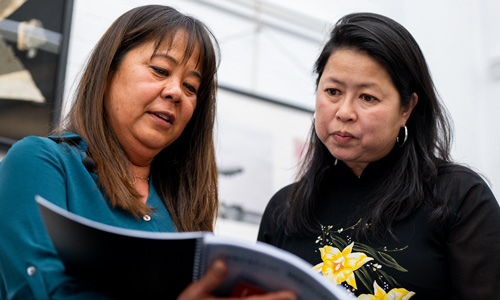
This spring, Regis’ Center for the Study of War Experience (CSWE) celebrated the 30th anniversary of its annual speaker series, Stories from Wartime. This unique speaker-series-turned-undergraduate-course engages both Regis students and the larger community in conversations about the realities and mundanities of war.
Stories from Wartime has landed its focus this year on the experiences of the Vietnam War, as this April marks 50 years since the United States officially pulled out of the Vietnamese front. Beyond the frontlines, thousands of volunteers, care workers and nurses contributed to stabilizing a war-torn Vietnam.
Operation Babylift was the official title retrospectively given to a variety of efforts to care for and evacuate Vietnamese refugee children to the United States where they would be adopted by families worldwide. By the end of the operation, more than 3,000 children were relocated to the United States and Australia. Despite the impact of this operation, many details of children, caretakers and aid went unrecorded and unpreserved –– or were unduly lost.
The initial mission of Operation Babylift on April 4, 1975, ended in tragedy. A critical failure of the C-5A Galaxy aircraft caused an explosive decompression, forcing an emergency landing that ravaged the plane apart. Of the 315 passengers, nearly half perished in the crash. Those who survived continued their journeys to the United States and worldwide.
Meet Devaki Murch: Operation Babylift adoptee and survivor of the of the C-5A Galaxy crash. Growing up in Kauai, Hawaii, Murch thrived in the cultural melting pot, finding her identity in diversity. The media documentation was all she had regarding what she describes as “the me before I was me.”
“I always tell people that I don't have a hospital bracelet, I don't have a baby book,” Murch said. “What I have are front page news articles and a passenger survival manifest.”
For almost her entire life, Murch has collected information about Operation Babylift and the C-5A Galaxy crash. In 2005, Murch visited Vietnam on a cultural heritage discovery trip which was designed to connect Vietnamese adoptees with their 'motherland.’ Murch connected with Sister Mary Nelle Gage, a Sister of Loretto, graduate of Loretto Heights College (LHC) and volunteer of the Friends For All Children program in Vietnam, who reignited her passion for documentation.
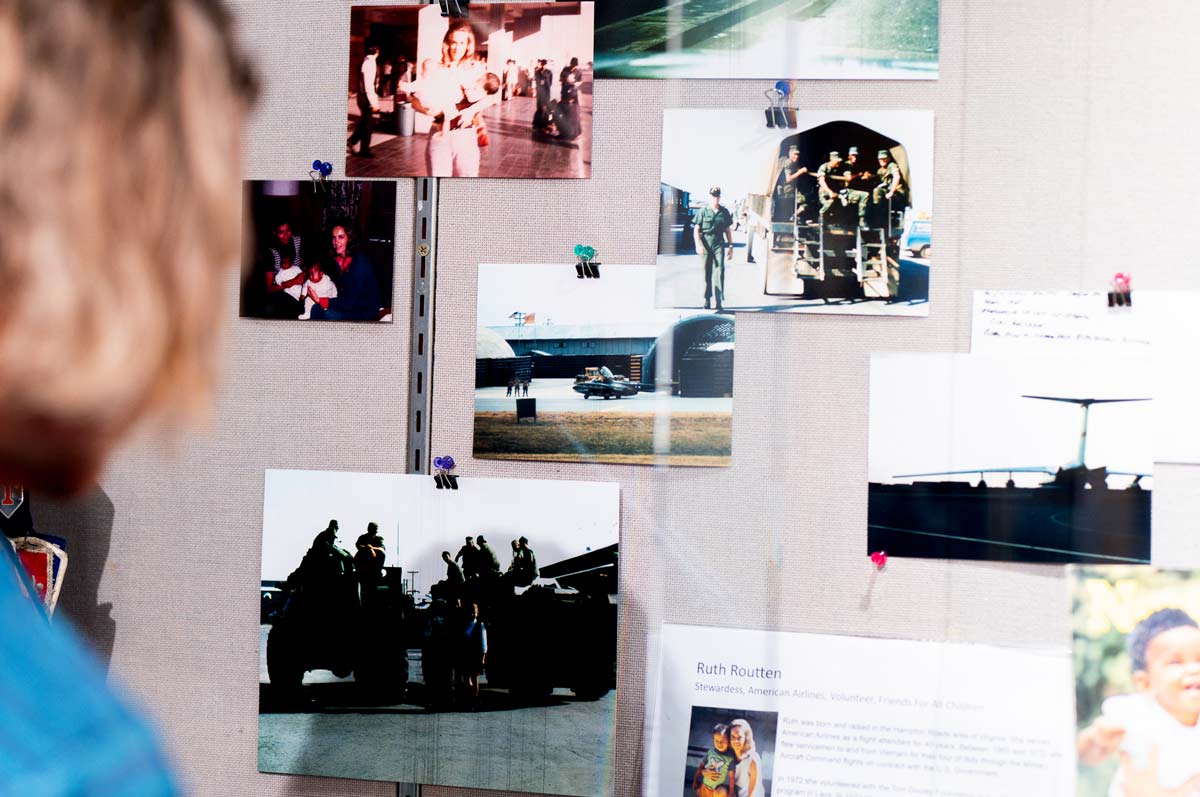
Photos, ledgers and other artifacts have all been incorporated into Murch’s collection.
Earlier this year, Devaki Murch, in collaboration with the Center for the Study of War Experience, hosted "Operation Babylift: New Perspectives,” in Regis’ Dayton Memorial Library. This exhibit showcases newspapers, ledgers and photographs from the media legacy of Operation Babylift, gifted to her by Sister Mary Nelle.
According to Murch, the project began as a way to recognize the efforts of the many volunteers who aided in Operation Babylift: a collection of thank-you notes from Babylift adoptees and their families. But as she became more acquainted with the aging volunteers, who entrusted Murch with their surviving documents, this “thank you” gift evolved into a campaign to preserve their memories for future generations.
“What I found out is, you know, a notebook of thank-you notes was nice, but what they really wanted was help finding out what to do with all of these archives upon their passing,” said Murch. “This project is for them.”
Murch’s professional background in brand development gave her the knowledge and skills to prepare her own materials for the exhibition, but she realized quickly that she needed archival expertise. In May of 2024, Murch and Sister Mary Nelle reached out to the Regis University Library Archives and Special Collections staff and the Center for the Study of War Experience.
"Sister Mary and I spoke with Hannah Miller, Kate Burns and Sean Gruno about archives,” said Murch. “They have been instrumental both in my journey of finding out how to organize all of this, but also the processes and considerations that you have to take with personal items and information.”
The Regis University Archives and Special Collections are a robust educational resource of both the history of the university and of cultural artifacts and documents that enhance culture. Murch’s relationship with Regis was spurned by the efforts of both the Regis Library and the CSWE in making information accessible for all Regis students, faculty and the community beyond.
“It has been absolutely amazing to be a part of it, because of the support that we have,” said Murch. “The way that the Library and the Archives department, specifically conduct themselves in the way that they curate the exhibits, the way that they interact with the community and the students is so incredibly impressive.”
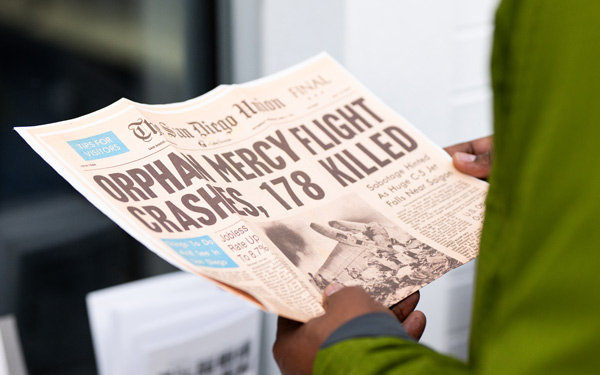
At the same time, the CSWE became intertwined with Murch and the Operation Babylift Collection. Co-director of the CSWE, Rose Campbell, described the necessity of aligning projects that focus on narratives that showcase a wider variety of experiences than what conventional histories illustrate while also examining how war is remembered – through media and experience alike.
“I think it was a natural coming together of a shared mission of representing histories that are conventionally underrepresented and providing the space for people to share their stories,” Campbell said.
Devaki Murch continues her relationship with Regis beyond this exhibition to forge an informational network for adoptees. Student interns with the Regis Library will assist in digitizing ledgers, forms and ephemera in Murch’s collection to form an accessible database. The purpose of this database is two-fold: creating permanent records of these documents and forging and maintaining new relationships.
In Murch’s vision, the digital index will allow Operation Babylift adoptees and their families to cross-reference their own histories and documents with previously inaccessible data. Using a specific set of parameters, users can view an individual adoptee’s files – giving them the same chance Murch had to rediscover her roots.
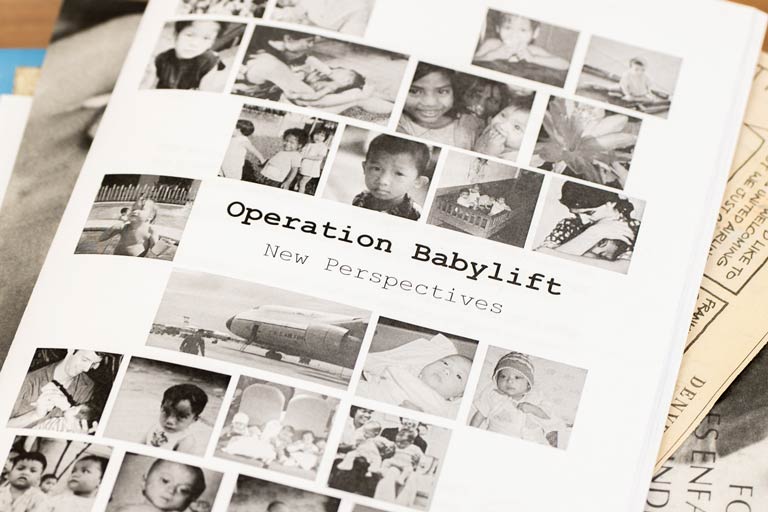
Explore the Operation Babylift Collection and connect with Devaki Murch

Article by Hadley Jenkins
About the AuthorMore From This Issue
Share Your Thoughts
Email us or write in to the Regis University Magazine at 3333 Regis Blvd, L-27, Denver 80221
